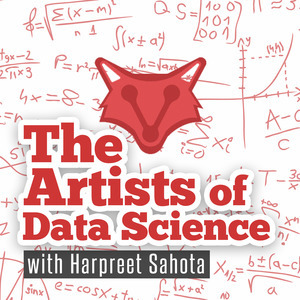Why You Have More Information Than You Think | Douglas W. Hubbard
September 7th, 2020
1 hr 7 mins 16 secs
Season 5
Tags
About this Episode
On this episode of The Artists of Data Science, we get a chance to hear from Douglas Hubbard, a management consultant, speaker, and author in decision sciences. He's the inventor of the Applied Information Economics method and he's an internationally recognized expert in the field of measuring intangibles. He is also the author of many books, with his most recent one being “How to Measure Anything in Cybersecurity Risk”.
Doug shares with us his journey into quantitative methodology, how to measure and quantify intangible things, and some of the misconceptions of statistics that are still being propagated. Doug’s expertise and knowledge in statistics is vast, and our listeners can gain a whole new perspective in measuring intangibles!
WHAT YOU'LL LEARN
[14:47] How data scientists can benefit from the methodologies of applied information economics
[25:28] The Fermi decomposition
[30:54] Three reasons why people think something can’t be measured
[41:59] The concept of statistical significance
[47:56] The difference between a Bayesian and frequentist
QUOTES
[21:18] “...measure with micrometer, cut with an axe.”
[27:10] “...it's really easy to get lost in all the stuff you don't know”
[43:11] “It's not just literacy you have to improve. It's not just that we have to learn new things about statistics. We have to unlearn misconceptions.”
[43:52] “If you know almost nothing, almost anything will tell you something.’
SHOW NOTES
[00:01:36] Introduction for our guest today
[00:02:59] Talk to us how you first got interested in measuring the intangibles?
[00:05:14] What were some notable projects that you worked on during the early part of your career that helped you shape your philosophy of being able to measure anything?
[00:09:20] What is applied information economics?
[00:12:14] The importance of taking ideas from different domains and combining them in new days.
[00:14:32] How do you see Data scientists benefiting from using the methodologies of applied information economics?
[00:17:04] Where do you see the field of quantitative methodology headed in the next two to five years?
[00:22:30] The difference between a decision models and predictive models
[00:25:04] How to measure anything with Fermi decompositions
[00:30:37] The three reasons people think something can’t be measured
[00:38:16] Common misconceptions about statistics
[00:41:52] Why is it so challenging for people to understand that concept of statistical significance and what it actually represents?
[00:46:42] A purely philosophical interlude on Bayesian statistics
[00:56:12] What’s the one thing you want people to learn from your story and from your work?
[00:58:19] Jump into a quick lightning round. If you could meet any historical figure, who would it be?
[00:58:38] What's the one thing you would say we truly cannot measure?
[01:01:19] If you could have a billboard placed anywhere, what would you put on it?
[01:01:25] What's the number one book, either fiction or nonfiction or even one of each that you would recommend our audience read, and what was your most impactful takeaway from it?
[01:03:33] What is the best advice you have ever received?
[01:04:42] Where can people find your books?
[01:05:46] How can people connect with you? Where else can they find you online?
